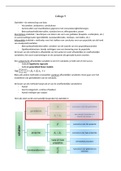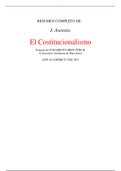Content:
1. Context of the French Revolution (1789-1815)
a. Ancien Régime system
b. Meeting of the Estates-General
2. A series of revolutions: three stages
a. The moderate stage (1789-1792)
b. The radical stage (1793-1794)
c. The directory (1795-1799)
d. + The age of Napoleon (1800-1815)
3. The legacy of the FR
4. Interpreting the FR
FR - conceived as the beginning of the 19C; seen as marking the beginning of the period in which modernity in
Europe/the ‘European modern man’ was created.
After the FR and Napoleonic Empire there is a conservative backlash/tendency to undo part of the workings
of the FR.
1. Context of the French Revolution (1789-1815)
● The FR is not the first revolution of its kind.
FR should be placed in a historical continuum with at least 2 other revolutions:
- Glorious Revolution (1688-1689, England)
- Different monarchies, different families in UK
- Different religious origins: Catchilic Church, Protestant Church.
⇒ Abdication (under immense pressures) of Catholic King and replacement by Protestant
king.
- American Revolution (1775-1783)
- Different motive, different outcome: settlers in the US were still highly dependent on rule from
the UK - received/had minimal rights in British parliament --> completely governed by foreign
rule/body, in which they had little/no say.
- Meanwhile they were paying taxes: “no taxation without representation” - wanted to have
more fair representation in the UK, but in general also independence.
- Outcome: American independence from the UK.
==> People in the 16-17-18C were rebelling all the time: against authority, Church, politics, etc.
● Impact of these revolutions: (and why they matter to the FR)
- England: sharp breach with tradition of ‘divine right to rule’ of kings.
The switch from a Catholic to a Protestant king is crucial.
In CC - longstanding tradition to conceive the head of the Church - Pope based in Rome - as the representative
of God on Earth. It was the Pope who was invited to anoint the king, sharing his worldly powers, his
representation of God with the King and the Royal family.
--> Both the Pope and the King are seen as spokesmen of God.
As long as they fitted within this Roman Catholic tradition, they were conceived as having a DRTR.
==> If God has granted you the right to rule, you don’t have to account to ordinary people.
Within the Protestant tradition, there’s a much greater emphasis on every individual religious person and their
reading/interpretation of the Bible.
--> Completely different hierarchies within the Protestant Church.
, ==> Changing the king and his religious beliefs in England meant that the English king could no longer claim
to have an absolute DRTR.
==> This switch also meant the king now had to account to those he was ruling over.
● If no Roman Catholic could be king, then no Kingship could be unconditional.
○ There’d always be some sort of account giving for their actions to the people.
Huge ramifications: suddenly there’s a relationship of ‘democratic control’ created with the people.
Happened in the UK partly due to its very complex royal family and constant rivalries over the throne.
==> England, as a result of the Glorious Rev, has its own traditions.
At the time, it was the most democratic country in the sense that there was already the switch that the DRTR of
the king is no longer accepted. This was not the case in Continental Europe - the king is still absolute ruler &
his DRTR still uncontested.
The rules and practices of England also circulate on the European continent and add to the dismay of the people
- they’d like to see it copied.
- USA: rights of representation & revolt against ‘unjust’ rule.
Claim for fair representation; American revolutionaries made the case that if government is conceived as
illegitimate by the people, that the people have the right to rebel. -->presents a claim for popular sovereignty,
again challenging the authority coming from above, claiming instead that a ruler should account to the people.
If the people are fed up, they can get rid of the ruler and the system.
Both the Glorious and esp the American Rev were greatly inspired by liberal philosopher John Locke:
John Locke (1689): Two Treatises of Government:
= a case for constitutional monarchy (= non-elected monarch is head of the state within the limits of a
constitution. Political power is shared between the monarch and an organised government (parliament).)
● Two premises - quite controversial at the time
1) No DRTR: No government can be justified by one’s appeal to the divine right of kings
2) Legitimate governments would always be founded on the consent of those governed.
● He was a social contract theorist (justification for the state):
○ State of nature - rational man --> peaceful view on man
Believed in human capability of finding a peaceful cohabitation. (Vastly different to Hobbes - another contract
theorist: the state of nature is constant warfare with no government restraining us. Need for almighty king to
deal with constant warfare.)
Locke sees the state of nature as reasonable individuals - even in a position of imperfect security, we’d find a
way of negotiating, deliberating. But there’s never an absolute guarantee that people wouldn’t act irrationally.
==> Why a state is needed: to provide security to enjoy your properties (including your own life). Reasonable
individuals would collectively transfer part of their sovereignty to a state body. They are capable of
self-government, but a government facilitates our cohabitation because it brings more stability --> does not lead
to an absolute tyrant but to a civil government that constantly needs to account for what it does.
⇩
○ Civil government founded on popular sovereignty.
Run-up to the FR
1) Economics: Financial Bankruptcy
Near to financial bankruptcy.
France - was a very big country; but had made a lot of financial investments of different nature:
- Louis XIV (‘Sun King’) mass expenditures: Palace of Versailles
- Seven Years’ War between England-France: loss of many colonies
- Had provided lots of financial support in the American Rev.
- Poor harvests, famine, and already harsh taxes and income inequalities.





